Volunteer for a beach clean to help make a difference
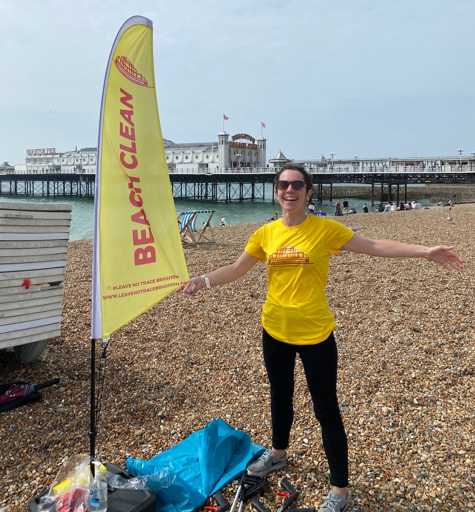
Did you know beach cleans not only help clear up our coastline, but they also help organisations, such as the Marine Conservation Society, gather data that helps track litter back to source, and campaign for change? Our Nikwax Sustainability Manager, Georgie Mcloughlin, lives on the East Sussex coast and is actively involved in her local beach cleans; gathering, sorting and reporting on the vast array of plastic and non-plastic litter that is the scourge of our beaches. Here, Georgie shares her beach cleaning insights in the hope you might volunteer your services too…
Plastic waste in our seas is a huge problem; at least 14 million tons of plastic ends up in our oceans every year and 80% of marine debris is plastic. Plastic has even been found in the most remote and extreme parts of the world, with debris found on Mount Everest and in the Mariana Trench, which is the lowest point on the planet extending over 11,000 meters below sea level.
For the last 3 years, the Marine Conservation Society (MCS) has been running the Great British Beach Clean (GBBC), a week-long citizen science event aimed at looking at the type of litter we find on our beaches in the UK. The data collected helps to fuel the MCS’s research, and in turn help them campaign for change.
As a Brighton and Hove resident, I’m lucky enough to have the beach on my doorstep; the walk along the pebbles never gets easier and the Channel seemingly never gets warmer, but it’s hard not to love it.
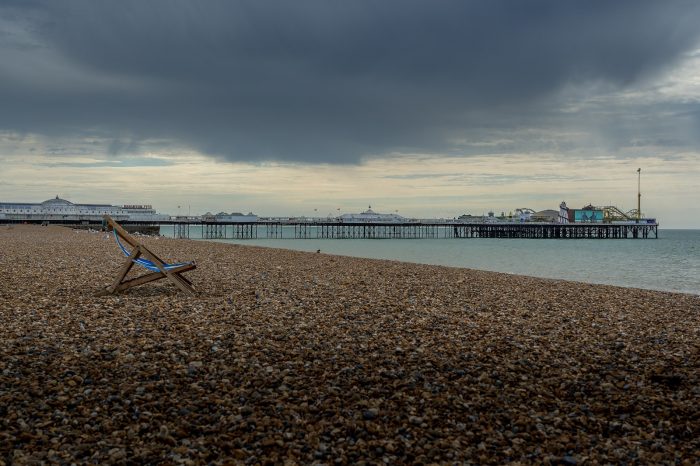 © Nick Fewings, Unsplash
© Nick Fewings, Unsplash
However, from late May to early September, I’m often sharing the beach with hordes of people taking advantage of the once-every-few-weeks British summer sunshine. Unfortunately, as the crowds head home, they leave behind an inordinate amount of waste (on one particularly warm weekend, 11 tonnes of waste was collected in 1 day). During the 2022 Great British Beach Clean (GBBC), the MCS found that 40% of all litter collected was public waste, with nearly 70% of that being plastic or polystyrene waste.
It was because of this I decided to volunteer for Leave No Trace Brighton, a local non-profit that campaigns to raise awareness of and protect our beaches and green spaces. During the summer we ran community beach cleans every month, and recently helped to organise one alongside the team at the Rampion Wind Farm Visitor Centre during this year’s GBBC. Based off the Sussex coast, the Rampion Wind Farm was completed in 2018 and can produce enough power to supply approximately 350,000 homes with electricity – more than double the number of homes in Brighton and Hove. This saves approximately 600,000 tonnes of CO2 a year.
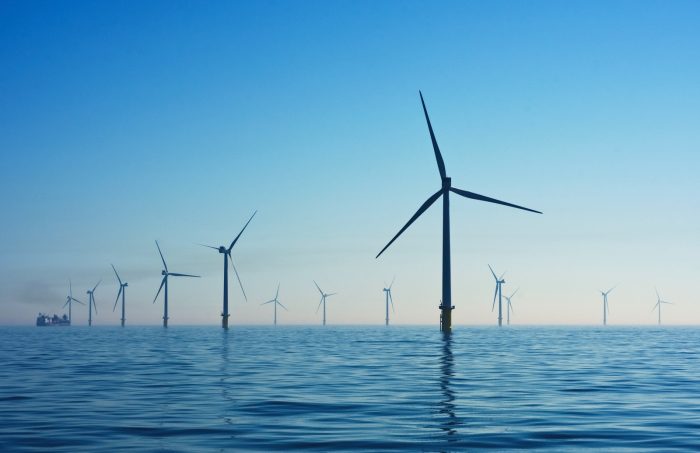 © Nicholas Doherty, Unsplash
© Nicholas Doherty, Unsplash
It is always inspiring how many people show up to these cleans, either on their own, with friends or with the whole family. It’s clear that the issue of beach waste resonates with many. On Brighton and Hove beaches, the worst litter offenders are plastic cups and bottles, disposable vapes, cigarette butts, beer bottles and caps, fishing wire and disposable barbeques (despite there now being a BBQ ban in place in the area). You’ll see in these images some of the waste that was collected during the recent Rampion Windfarm clean; lots of wrappers, plastic bottles and plastic cutlery – waste that could so easily have been disposed of in a bin or at home. Part of my role as a volunteer is to sort through the waste and separate out as much of it as possible to be recycled. We’re fortunate to be working with other organisations to ensure that the plastic we collect can be recycled, which sadly isn’t as much as we’d like due to limitations in recycling services.
As for the plastic and litter that is missed, this often gets washed into the sea with the changing tides. Over time (often 10’s if not 100’s of years), the plastic slowly breaks down into tiny fragments known as microplastics. Plastic and microplastics are a huge concern for marine life, who often mistake plastic debris for prey and who can easily digest microplastics, which also increases the likelihood of contamination within our seafood. Now, microplastics are everywhere – even in the air we breathe, and last year, for the first time, researchers found evidence of microplastics in human blood.
What can you do to help?
Here are three key things everyone can do to help reduce waste and plastics in our environment:
- Look up a local litter pick or beach clean in your area. It’s not just in the ocean that plastic waste is an issue, so any effort to help with rubbish collection will be benefiting your local environment and wildlife.
- ‘Take 3 for the sea’ is a phrase used all over the world as a quick and direct action we can all do, encouraging us to take with us 3 items of rubbish every time we leave the beach. If you can’t join a local clean or litter pick, always be mindful when enjoying the outdoors and collect any rubbish you see.
- Remember the five R’s that help prevent plastic pollution; refuse, reduce, reuse, repair, recycle. I find this diagram helpful:
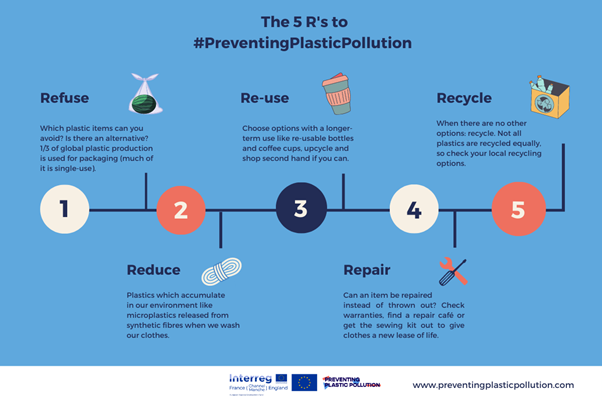
Links to resources and facts quoted
https://www.iucn.org/resources/issues-brief/marine-plastic-pollution
https://www.rampionoffshore.com/about/key-facts/
I would like to join beach clean-up on the NE Coast from Hull to Whitby !!
When is the Great British beadch clean please?
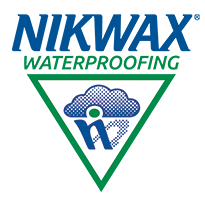
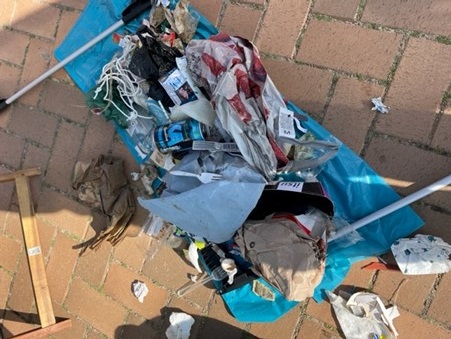
Once a month seems quite lightweight! We have a group pick every Sunday and people go out in smaller groups during the week. A monthly total is reported on NextDoor. Last month some of the group picks became Himalayan balsam pulls to prevent further spread.
So much to do.